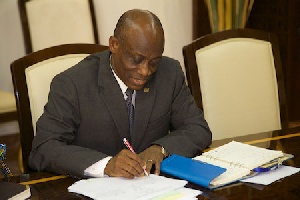- Home - News
- TWI News | TV
- Polls
- Year In Review
- News Archive
- Crime & Punishment
- Politics
- Regional
- Editorial
- Health
- Ghanaians Abroad
- Tabloid
- Africa
- Religion
- Election 2020
- Coronavirus
- News Videos | TV
- Photo Archives
- News Headlines
- Press Release
General News of Sunday, 16 August 2015
Source: The Finder
Ghana’s GH¢89.5b debt: Terkper says no cause for alarm
Finance Minister Seth Terkper says Ghana’s current debt level is within acceptable limits and, therefore, there is no cause for alarm. According to him, the Policy Based Guarantee of $400 million signed with the World Bank corroborates the assertion that Ghana’s debt level is not out of gear.
The Policy-Based Guarantee will cover securities issuance of up to $1 billion by government while the credit guarantee is expected to contribute to the nation’s attainment of key macroeconomic targets outlined in the budget.
Ghana’s debt hit GH¢89.5 billion at the end of May 2015, approximately 67.1 percent of GDP. Some economists, market watchers and the Minority in Parliament fear Ghana could replicate the Greece crisis where over-borrowing has crippled a member of the European Union economy.
But the Finance Minister says there is a debt management strategy where a sinking fund has been created from oil revenue to take care of Ghana’s debt. According to him, part of the strategy is also to allow state owned enterprises repay monies borrowed.
Ghana will be going to the international capital market next month to borrow $1.5 billion from investors.
According to Mr. Terkper, “part of the sovereign bond for this year will be used to pay for the 2017 maturing sovereign debt. Part of it will also be used to refinance the short term bonds so that we can use it to extend our debt profile from 3 years to 12 or 15 years.
The essence is instead of paying hefty amounts within 90 days, one year or 3 years, we will have the opportunity to pay over a longer period.”
Mr. Terkper is also confident Ghana’s credit ratings that were downgraded recently by the international ratings agencies including Fitch and S&P will be re-instated. “Let me say emphatically that I am hopeful that we are going to return to our ratings, the once that we lost given the current performance of the economy and trajectory.”
According to him, “Ghana has been making corrections concerning budget over-runs and stability in the economy, and, therefore, the progress chalked is a testimony for all to see.”
Mr. Terkper noted that government will not overrun its budget by spending majority of its tax revenue on salaries.
Presently, 70 percent of the nation’s tax revenue goes into public sector wages.
Moody’s, for instance, downgraded Ghana’s sovereign rating to B3 with a negative outlook in March 2015 while Fitch in the same month cast doubts on the ability of government to service its debts in the future after revising the outlook on Ghana’s rating from stable to negative.
But the Finance Minister said the achievement chalked so far in stabilizing the economy will compel the agencies to take a second look at their ratings about Ghana.
Mr. Terkper also noted that the nation has been making improvements in subsidies and due to that donor funds that were stalled have started flowing.
Presently, Ghanaians are almost paying full cost recovery for fuel as the partial deregulation continues whilst utility tariffs have been increased.
Entertainment










